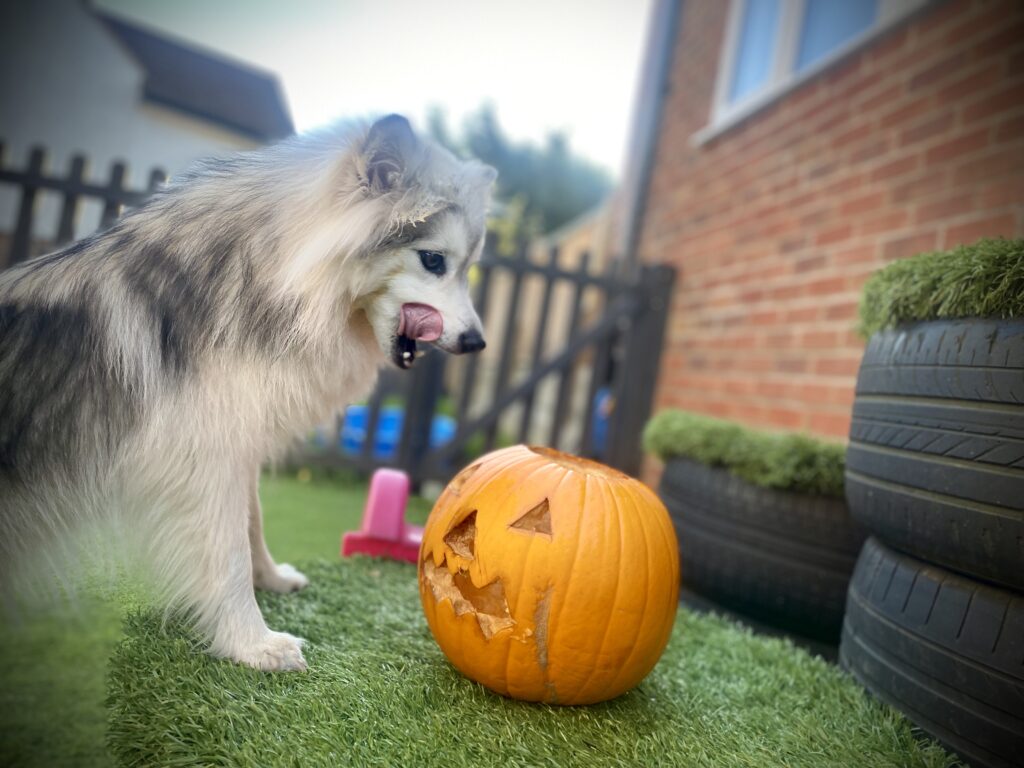BENEFITS OF PUMPKIN FOR YOUR DOG

Pumpkins and pumpkin seeds are healthy foods for humans, and they also have several known health benefits for dogs. Dogs can safely eat pumpkin seeds as well as cooked or raw pumpkin. It is always best to check with your veterinarian to determine a healthy percentage of pumpkin as an addition to your dog’s diet.
Plain canned pumpkin is a healthy and convenient option, provided you only use 100 percent canned pumpkin purée. Do not feed your dog canned pumpkin pie filling, as this product includes unhealthy sugar and sodium. Purchase only raw, unsalted pumpkin seeds for your dog. When it comes to pumpkin seed you will want to discuss the quantity with your veterinarian, which is typically based on your dog’s weight.
Most dogs like the taste of plain pumpkin, and will happily eat it alone or mixed into their regular food. Many dogs enjoy pumpkin seeds as snacks, but these can also be ground and added to food if your dog is reluctant to eat them alone.
The following benefits will convince you to make pumpkin and pumpkin seeds a regular part of your dog’s diet.
NATURAL REMEDY FOR WORMS AND PARASITES
Pumpkin seeds contain the amino acid cucurbitin, which works to paralyze and eliminate parasites from your dog’s digestive tract. Feed the seeds whole, or grind and add to food. Give your dog one-quarter teaspoon per ten pounds of body weight once or twice daily until the worms are gone. Using pumpkin seeds instead of veterinary dewormer will allow you to avoid dosing concerns and side effects such as diarrhea, vomiting or allergic reaction. Pumpkin seeds are a safe dewormer and also provide quality protein, amino acids and many nutrients.
PUMPKIN SUPPORTS DIGESTIVE HEALTH

Pumpkin flesh is high in soluble fiber, and can be an excellent remedy for both diarrhea and constipation. The fiber in pumpkin also helps feed beneficial gut bacteria, which will improve intestinal health. Pumpkin helps control diarrhea by absorbing excess moisture and adding bulk to your dog’s stool. On the other hand, the high water and fiber content of pumpkin can help ease constipation and keep digestion moving smoothly. A little bit of pumpkin is all that is needed. Start with a couple of teaspoons daily for smaller dogs. One or two tablespoons may be needed for larger dogs. Include pumpkin in the daily diet to help keep your dog regular, even if diarrhea and constipation are not current problems.
PUMPKIN IS Filling
Adding pumpkin to your dog’s food is a great way to bulk up the diet without adding a lot of calories. The extra fiber in the pumpkin will help your dog feel fuller longer, even if you reduce the amount of dog food given. Substitute a tablespoon for one-quarter cup of dog food. Your dog will not miss the extra calories and will likely appreciate the added variety the pumpkin provides.
PUMPKIN SUPPORTS URINARY HEALTH
Pumpkin flesh and seeds contain oils that are believed to support urinary health. Dogs with urinary incontinence may see improvement when pumpkin seeds and flesh are added to the diet. As with other uses, only small amounts are needed to see benefits.
PUMPKIN IS HIGH IN ANTIOXIDANTS AND VITAMINS
The carotenoids in pumpkin, which give pumpkin its deep orange color, are beneficial antioxidants. Pumpkin seeds, in particular, are often noted for their high and diverse antioxidant levels. A diet high in these antioxidants can help slow the aging process, protect eye health and fight inflammation and its related diseases.
Pumpkin is also high in several vitamins and minerals including Vitamins A and C, zinc and magnesium. Vitamin A is important for vision health, while Vitamin C is well-known for its role in immune system health. The additional Vitamin C from pumpkin can also be beneficial for dogs with joint and mobility problems. The zinc in pumpkin can contribute to a healthy skin and coat. Magnesium is needed throughout the body and can support bone, vision and nervous system health.
As always, we hope this information has been useful!
Regards,
SuPaw Nanny
Source: information courtesy of Eastside Animal Hospital
